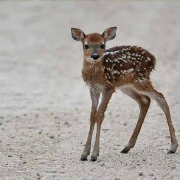FWC: Baby Wildlife ‘Rescues’ Usually Not Necessary
By FWC // May 12, 2014
ABOVE VIDEO: A male manatee calf was found in a cove in Titusville, FL, suffering from cold stress. FWC staff and volunteers conducted the rescue, then staff transported the calf to Lowry Park Zoo’s manatee hospital. Upon arrival, their veterinarians conducted a health assessment and provided additional care. He’s still at the zoo, receiving around-the-clock care by a team of veterinarians and animal care staff.
TALLAHASSEE, FLORIDA — You come across a baby deer, bird or other helpless looking baby animal. You might think that it has been abandoned or its parents killed but that may not be the case.

Adult wildlife must forage to provide food for themselves and their young. This means leaving their newborns for short periods. So if you come across a baby animal, don’t touch it and don’t feed it or take it home.
Don’t hang around, either, because its parent may be waiting for you to leave so it can return with food. Parents will also continue to feed juvenile birds that have fallen from the nest until the young ones learn to fly. You CAN help by keeping any pets that may harm the young birds indoors during the spring and summer. One exception is baby songbirds on the ground. If they have almost no feathers and can’t hop around, or were injured by pets, they may need rescuing.
One option is to place the baby in a tissue-lined box that has air holes in the top. Keep the box in a warm spot but out of direct sunlight, and then call a licensed wildlife rehabilitator: MyFWC.com/conservation/you-conserve/assistnuisance-wildlife/wildlife-rehabbers – otherwise, let nature nurture her own.
RELATED CONTENT: FWC Tips For Moving and Reporting Gopher Tortoises












